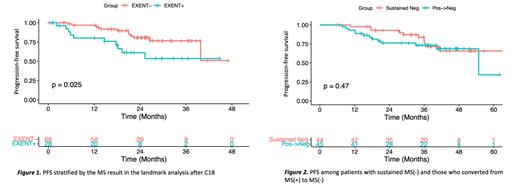Introduction
Minimal residual disease (MRD) assessment in bone marrow (BM) has emerged as one of the strongest prognostic factors in MM. Mass spectrometry (MS), capable of detecting MM-derived monoclonal proteins in peripheral blood with high sensitivity, has the potential to complement standard methods. While its role in evaluating residual disease and its prognostic performance compared to routine MRD assessments is not yet established, other unanswered questions remain: (1) What is the role of MS in response assessment for patients without a high disease burden baseline sample? (2) What is the optimal timing of MS assessment, considering the long half-life of immunoglobulins?
Methods
Stored serum samples collected at different timepoints [screening, cycle 6 (C6), C12, C18, C24, C36] from patients treated in the ATLAS trial, were analyzed using the EXENT® Immunoglobulin isotypes (GAM) assay (EXENT® Solution, in development by The Binding Site, part of Thermo Fisher Scientific), which utilizes MALDI-TOF MS. ATLAS is an ongoing phase 3 trial that randomized 180 patients with newly diagnosed MM after autologous stem cell transplantation (ASCT) to maintenance therapy with carfilzomib, lenalidomide, and dexamethasone (KRd) or lenalidomide alone (R). In the KRd arm, patients with standard-risk cytogenetics who achieved MRD-negativity after cycle 6 de-escalated therapy to receive R, from C9. No baseline diagnostic samples were available, and samples were not available for every patient at every timepoint. A sample was called positive by MS when the EXENT® solution confirmed the presence of an M protein, matching the known (diagnostic) isotype. BM MRD was assessed at the same timepoints using multicolor flow cytometry (MFC) with a limit of detection (LoD) of 10 -5 and next-generation sequencing (NGS, clonoSEQ, Adaptive, LoD 10 -6). Progression-free survival (PFS) was analyzed using the Kaplan-Meier method, with log-rank test for comparisons between groups. The data cutoff (31-Dec-2021) was the same as was used in the ATLAS publication by Dytfeld et al. Lancet Oncology 2023.
Results
585 samples from 138 patients were analyzed by MS. There were 349 paired BM MRD results by NGS; patients with MRD 10 -5 were considered MRD(+). The overall agreement between the two methods equaled 70%, with a comparable number of patients being MS+/NGS- (56/349, 16%) and MS-/NGS+ (50/349, 14%). The agreement at screening was 61%, but it improved at further timepoints and reached the highest level at C18 (74%). For BM MFC, there were 499 paired samples. There was 67% agreement, and the discrepancy was driven mostly by MS+/MFC- patients (125/499, 25%), whereas MS-/MFC+ was less frequent (40/499, 8%). The agreement was lowest at screening (60%), similarly to the NGS-based assessment, and reached the highest level at C18 (73%). Based on these findings, we concluded that C18 may be the optimal timepoint to assess prognostic role of MS results.
Using the landmark method, MS(-) following C18 was associated with superior PFS compared to MS(+) [HR=0.39 (95% CI: 0.17-0.91), p=0.025; Figure 1]. MFC [HR=0.13 (0.04-0.35), p=0.0002], and NGS [HR=0.15 (0.03-0.63), p=0.003] statuses were also associated with PFS using this landmark method. Although small numbers of patients preclude definitive conclusions, we observed a similar effect size in outcomes among NGS(-)/MS(-) vs NGS(-)/MS(+) patients [HR=0.14 (0.01-1.58), p=0.06] and MFC(-)/MS(-) vs MFC(-)/MS(+) [HR=0.40 (0.13-1.27), p=0.11], both favoring BM MRD(-) with concurrent MS(-).
Out of the 45 patients who were initially MS(+) and subsequently converted to MS(-), 23 (51%) occurred following C12 or later. Patients who converted from MS(+) to MS(-) had similar PFS to those with sustained MS(-) throughout the analyzed period [HR=0.74 (0.32-1.68), p=0.47; Figure 2], with the majority of PFS events in the converted group occurring during first 18 months of observation.
Conclusions
MS-based disease assessment in the post-ASCT setting is feasible in many cases, if information on the original MM clone is available by traditional methods. Our results suggest that the optimal timepoint for such evaluation can be as long as 18 months after ASCT. The EXENT® assay may be complementary to BM-based techniques for MRD assessment, allowing for more accurate prognostication when used in combination. Further studies are needed to confirm its exact timing and role in the disease evaluation algorithms.
Disclosures
Dytfeld:Amgen: Honoraria, Membership on an entity's Board of Directors or advisory committees; BMS: Honoraria, Membership on an entity's Board of Directors or advisory committees. Barnidge:The Binding Site: Current Employment. Sakrikar:The Binding Site: Current Employment. Lakos:The Binding Site: Current Employment. Gil:Pfizer: Honoraria; Janssen: Honoraria; Gilead: Honoraria, Membership on an entity's Board of Directors or advisory committees; Abbvie: Honoraria; Astellas: Honoraria; Celgene/BMS: Honoraria; Novartis: Honoraria. Zaucha:BMS: Research Funding; Medical University of Gdańsk: Current Employment; Pierre Fabre, Takeda, BMS, Gilead, Novartis, Pfizer, Amgen, F. Hoffmann-La Roche Ltd, Astra Zeneca, Abbvie: Honoraria; MSD: Research Funding. Walewski:Abbvie: Consultancy, Honoraria; Amgen: Honoraria; Gilead: Consultancy, Honoraria; Novartis: Consultancy, Honoraria; Roche: Consultancy, Honoraria, Research Funding; Takeda: Consultancy, Honoraria; GSK/Novartis: Research Funding; Servier: Honoraria. Robak:Abbvie: Honoraria; Janssen: Consultancy, Honoraria, Research Funding; OctoPharma: Honoraria, Research Funding; BeiGene: Honoraria, Research Funding; AstraZeneca: Honoraria, Research Funding; Regeneron: Honoraria, Research Funding; GSK: Honoraria, Research Funding. Jakubowiak:BMS: Consultancy, Honoraria, Membership on an entity's Board of Directors or advisory committees; Janssen: Consultancy, Honoraria, Membership on an entity's Board of Directors or advisory committees; Amgen: Consultancy, Honoraria, Membership on an entity's Board of Directors or advisory committees; Sanofi-Aventi: Consultancy, Honoraria, Membership on an entity's Board of Directors or advisory committees; GSK: Consultancy, Honoraria, Membership on an entity's Board of Directors or advisory committees; Abbvie: Consultancy, Honoraria, Membership on an entity's Board of Directors or advisory committees. Derman:COTA Healthcare: Consultancy; Janssen: Consultancy, Honoraria.


This feature is available to Subscribers Only
Sign In or Create an Account Close Modal